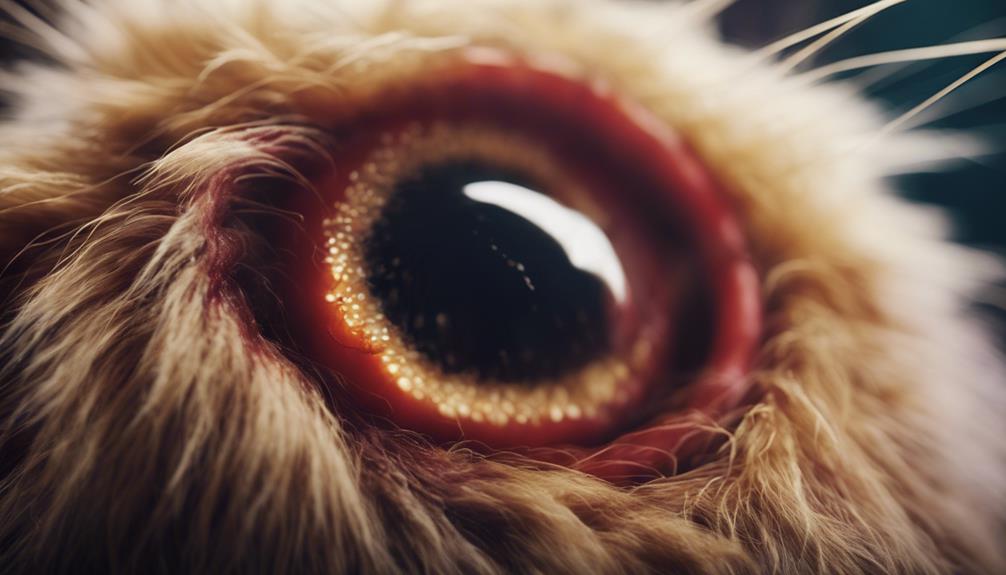When it comes to roundworm parasites in cats, the impact can be more significant than you might realize. From their transmission to the symptoms they cause, these parasites can pose a serious threat to your feline companion's health. But what about the potential risks they may carry for humans, especially those sharing a home with infected cats? Stay tuned to uncover the lesser-known aspects of roundworm infections in cats that might leave you more cautious than ever before.
Understanding Roundworms in Cats
When considering roundworms in cats, understanding their appearance and symptoms is crucial for early detection and treatment. Roundworms in cats can grow to be 3-6 inches long, appearing white or light brown, resembling spaghetti noodles. Toxocara cati is the most common type found in kittens, while Toxascara leonina is less common and typically seen in older cats.
Cats can become infected with roundworms from the environment, other infected animals, or by ingesting roundworm eggs or larvae. Kittens, in particular, are at risk of getting infected from their mothers while nursing. Proper diagnosis involves fecal examination to look for roundworm eggs. Once diagnosed, treatment includes targeted medications to eliminate the parasites effectively.
Additionally, monthly preventatives are essential in managing and preventing future roundworm infestations in cats. Being aware of the appearance, sources of infection, and proper treatment methods is vital in keeping your feline companion healthy and parasite-free.
Symptoms and Diagnosis of Roundworm Infections
Symptoms of roundworm infections in cats typically manifest as vomiting, weight loss, a dull hair coat, and a potbellied appearance. In severe cases, cats may also exhibit coughing if the roundworms migrate to the lungs. Adult roundworms, which can be several inches long and appear white or light brown, may be visible in feces or vomit.
To diagnose roundworm infections in cats, fecal examinations are essential to detect roundworm eggs. Additionally, a test for roundworm protein antigens can aid in confirming the presence of these parasites. Regular fecal examinations are crucial for early detection and treatment of roundworm infections in cats, as they help in monitoring the effectiveness of treatment and preventing the spread of these parasites to other pets or humans.
If you notice any of these symptoms in your cat, it's advisable to consult with a veterinarian promptly for proper diagnosis and treatment.
Treatment Options for Roundworm Parasites
You should be aware of the various treatment options available for roundworm parasites in cats.
Medications like Fenbendazole, Emodepside, Ivermectin, Moxidectin, and Pyrantel are commonly used to eliminate roundworms effectively.
Remember that regular treatment is essential for preventing roundworm infections in cats.
Medications for Roundworms
If your cat is diagnosed with roundworms, several effective medications like Fenbendazole, Emodepside, Ivermectin, Moxidectin, and Pyrantel are commonly used for treatment. Treatment usually involves giving multiple doses on a specific schedule to target all life stages of the parasite.
For cats between 3 and 9 weeks old, they should be treated every two weeks for roundworms, and then monthly after 9 weeks. Medications such as Fenbendazole, Drontal, and Profender are known to eliminate roundworm infections effectively.
Following the prescribed treatment schedule is crucial for your cat's recovery. Typically, cats recover from roundworm infections within 2-6 weeks if treatment is initiated early and followed as directed.
Prevention Methods for Roundworms
To effectively prevent roundworm infections in cats, regular deworming and minimizing outdoor exposure are key strategies. Cat owners should ensure that both kittens and adult cats receive routine deworming treatments as recommended by their veterinarian. Deworming kittens at each veterinary visit is crucial for their health, as they're more susceptible to roundworms.
Adult cats should also receive regular parasite prevention to safeguard against roundworm infections. Limiting outdoor exposure and hunting can help reduce the risk of roundworm transmission. Additionally, pregnant cats can be dewormed with safe medications to protect kittens from roundworm infections.
Natural Remedies for Roundworms
Feeding pumpkin seeds is a natural remedy for roundworms in cats, known for their anti-parasitic properties. Coconut oil, containing medium-chain fatty acids, can be added to your cat's food to help eliminate roundworms.
Additionally, diatomaceous earth, a natural substance, can be sprinkled on your cat's food to combat roundworm infestations. Herbal remedies like wormwood, cloves, and neem oil are also beneficial in reducing roundworm infections in cats.
Probiotics play a crucial role in supporting your cat's digestive system and fighting off roundworm infections naturally. By incorporating these natural remedies into your cat's routine, you can help manage and prevent roundworm infestations effectively.
Preventative Measures Against Roundworms
To protect your cat from roundworm infections, ensure to clean the litter boxes regularly and maintain a strict deworming schedule. By conducting regular fecal examinations and using appropriate parasite control products, you can prevent infestations effectively.
Keep your cat's living environment clean, consider indoor living, and avoid areas where animals defecate to minimize the risk of roundworm infections.
Cleaning Litter Boxes
Regularly cleaning your cat's litter box is essential for preventing the spread of roundworms and ensuring a healthy environment for your pet. To effectively tackle roundworm transmission, clean the litter box daily to remove any feces, which may contain roundworm eggs.
Use pet-safe disinfectants when cleaning to eliminate any potential contaminants. Avoid overcrowding of pets in the living space to reduce the risk of roundworm spread. Remember to wash your hands thoroughly after handling the litter box to prevent any possible contamination.
When introducing new cats or kittens, keep them separate until they've been examined by a veterinarian to ensure they're free of roundworms. By following these simple steps and maintaining a clean litter box, you can significantly lower the chances of roundworm infestations.
Regular Deworming Schedule
Implementing a regular deworming schedule is essential for preventing roundworm infections in cats. When it comes to deworming your feline friend, remember these key points:
- Kittens should be dewormed at every veterinary visit to ensure they're free from parasites.
- Adult cats also need routine deworming as part of their preventive healthcare.
- Following a deworming schedule recommended by a veterinarian helps maintain the cat's health.
- Preventative measures like regular deworming can help control and eliminate roundworm infections in cats.
Impact of Roundworms on Feline Health
If your cat is suffering from a major roundworm infection, you may notice symptoms such as vomiting, weight loss, dull hair, and a potbellied appearance. Roundworms, a common parasite in cats, can lead to respiratory issues when they move into the lungs, causing coughing.
Adult roundworms, expelled through feces or vomit, appear white or light brown and can be several inches long. To prevent these issues, regular preventive measures like fecal examinations and monthly treatments are crucial for managing roundworm infections in cats.
It's especially important for nursing mothers and kittens to receive monthly preventative treatments to decrease the risk of roundworm infections. By staying proactive with preventative care, you can help ensure your cat's health and well-being, reducing the likelihood of severe roundworm-related symptoms and complications.
Managing Roundworm Infections in Cats
To effectively manage roundworm infections in cats, prioritize timely treatment and regular preventive care. Here are some essential steps to help you manage roundworm infections in your feline companion:
- Treat kittens for roundworms every 2 weeks between 3 and 9 weeks of age to prevent major infections.
- Ensure regular fecal examinations are conducted 2 to 4 times in the first year of your cat's life and 1 or 2 times annually in adults to detect roundworms.
- Administer monthly preventive treatments to nursing mothers and kittens to reduce the risk of roundworm infections.
- Use monthly parasite control products that are effective against roundworms to manage and prevent infections in cats.
- Consult your veterinarian for guidance on the most suitable preventive measures and treatments for your cat's specific needs.
Frequently Asked Questions
How Do You Get Rid of Roundworms in Cats?
To get rid of roundworms in cats, follow veterinary advice for proper diagnosis, treatment, and prevention. Medications like Fenbendazole, Emodepside, Ivermectin, Moxidectin, and Pyrantel are effective. Deworm kittens every two weeks from 3 to 9 weeks, then monthly after 9 weeks.
How Do You Know if Your Cat Has Roundworms?
To know if your cat has roundworms, observe symptoms like vomiting, weight loss, dull hair, and a potbellied appearance. Look for adult roundworms, white or light brown, several inches long, in feces or vomit. Regular fecal exams help detect roundworms.
Can Humans Catch Roundworm From Cats?
Yes, humans can catch roundworm from cats. To prevent infection, practice good hygiene after contact with contaminated soil. Children and pregnant women are at higher risk. Avoid areas where animals defecate.
How Do Indoor Cats Get Roundworms?
To prevent roundworm infections, avoid contact with contaminated soil, rodents, or insects. Keep indoor cats away from potentially infected areas. Regularly check feces and seek preventive treatments. Remember, early detection is key to ensuring your cat's health.






